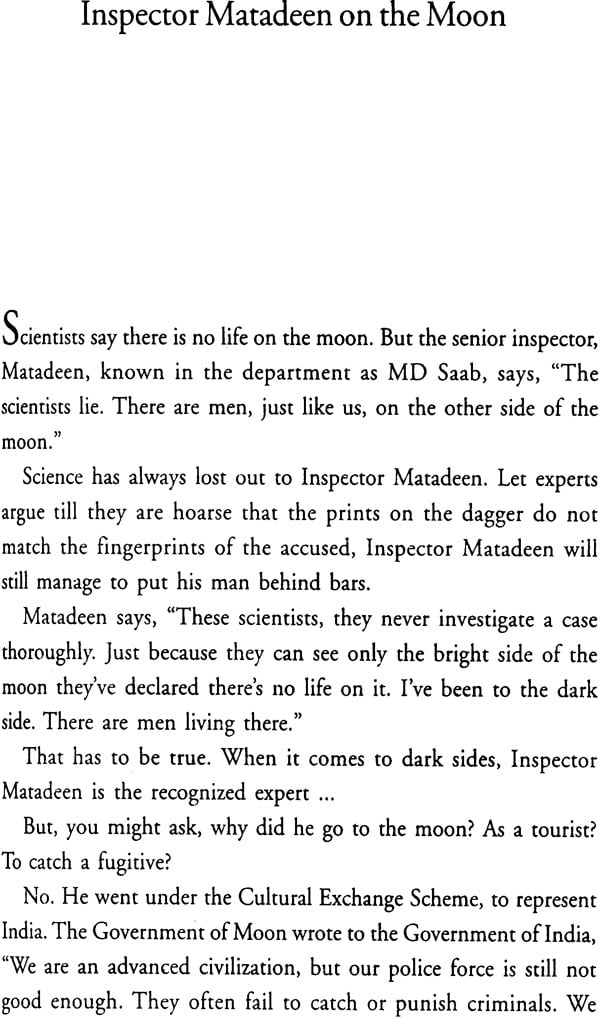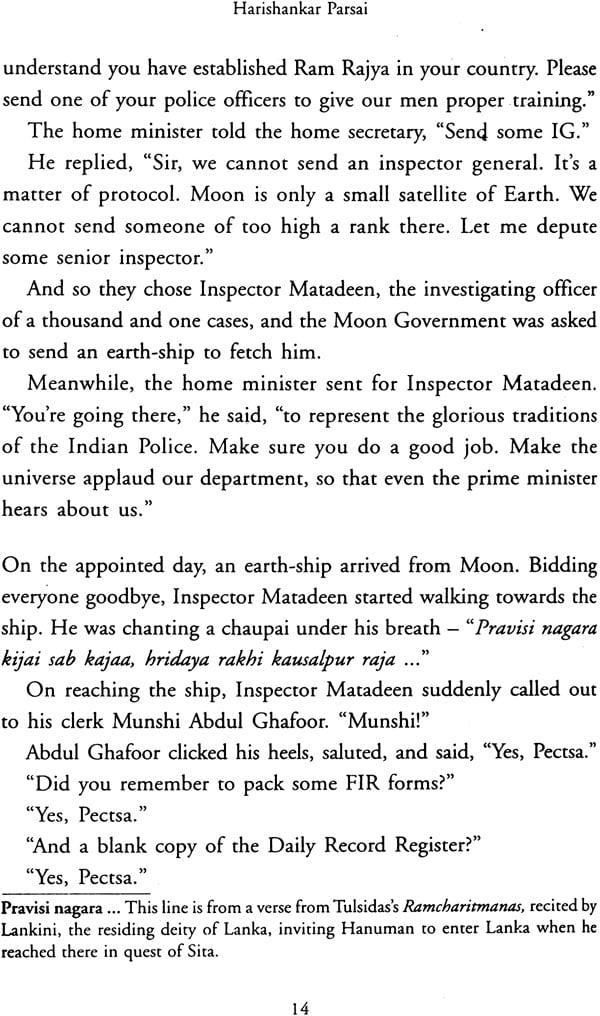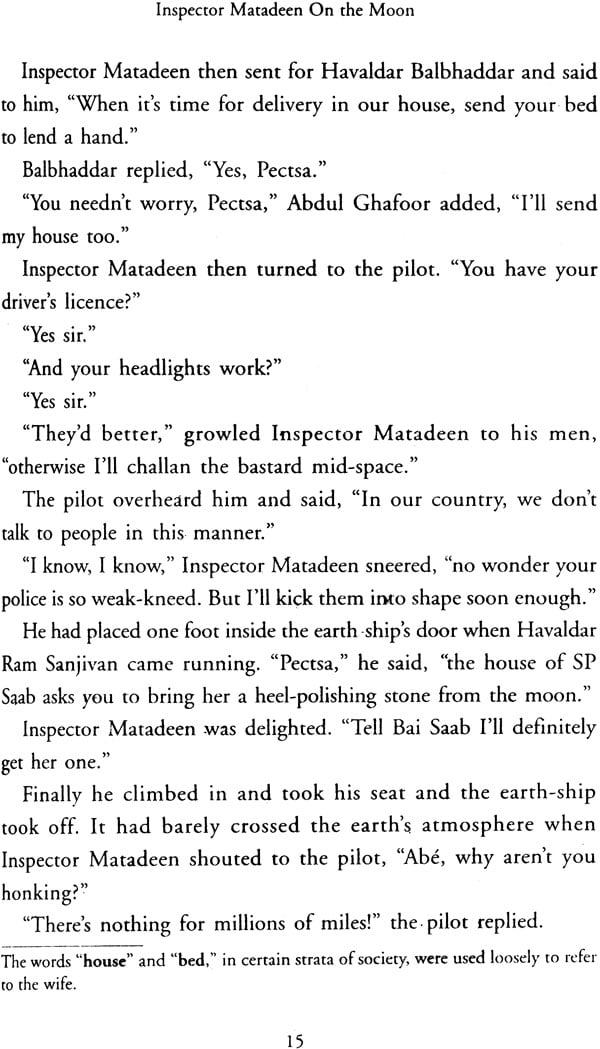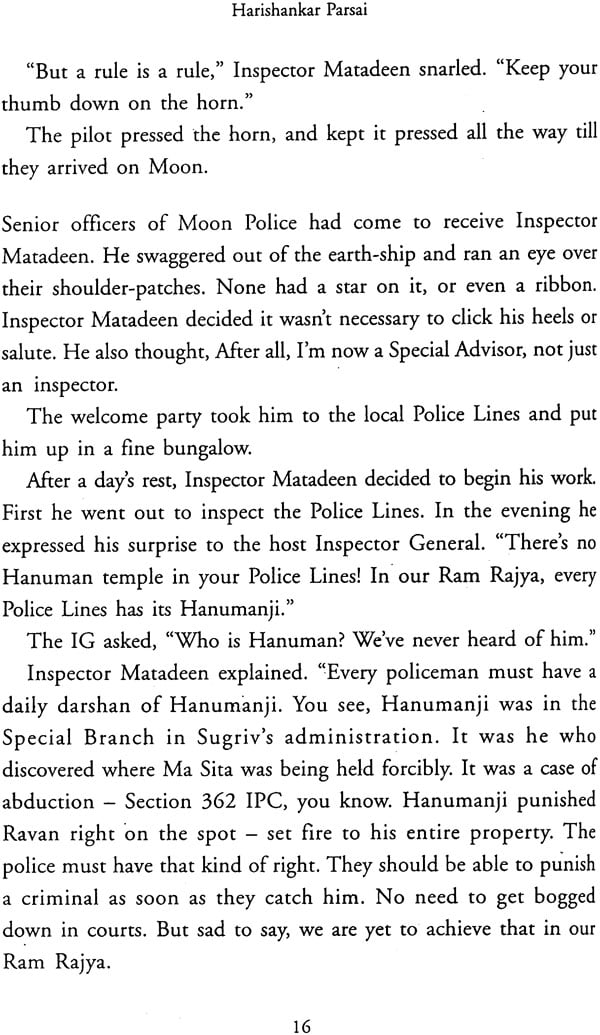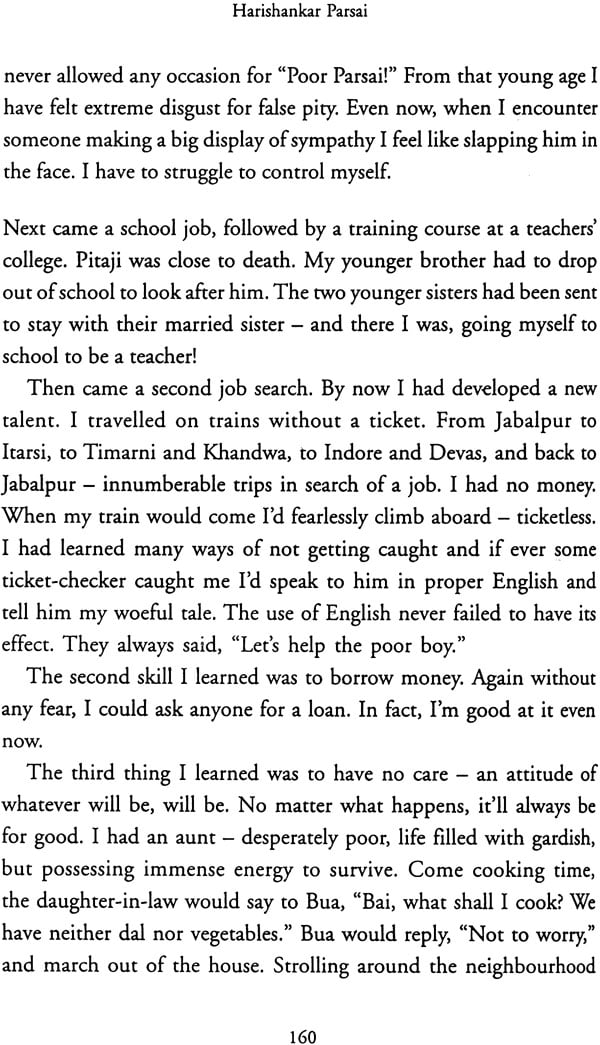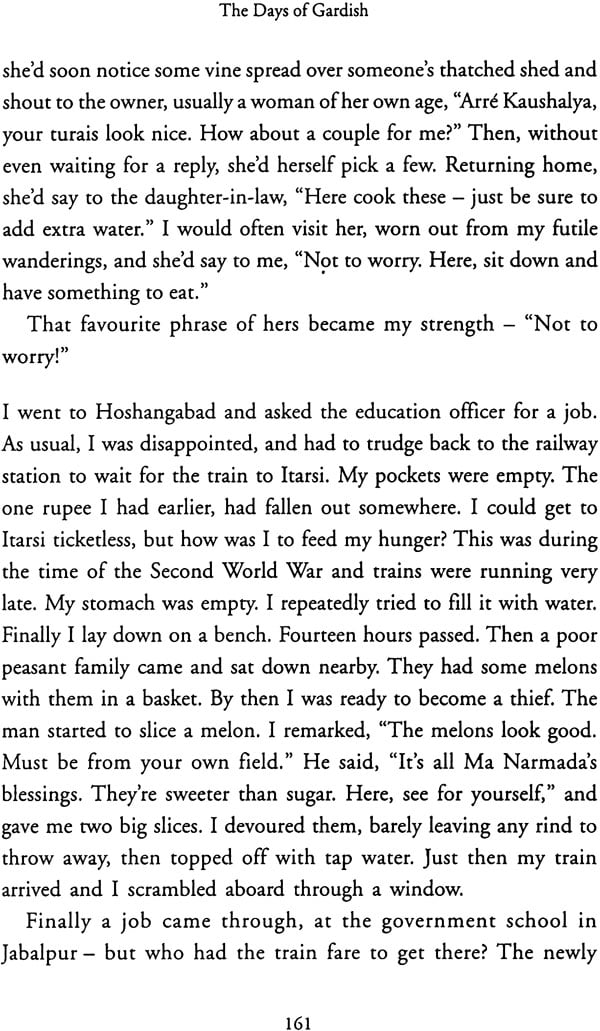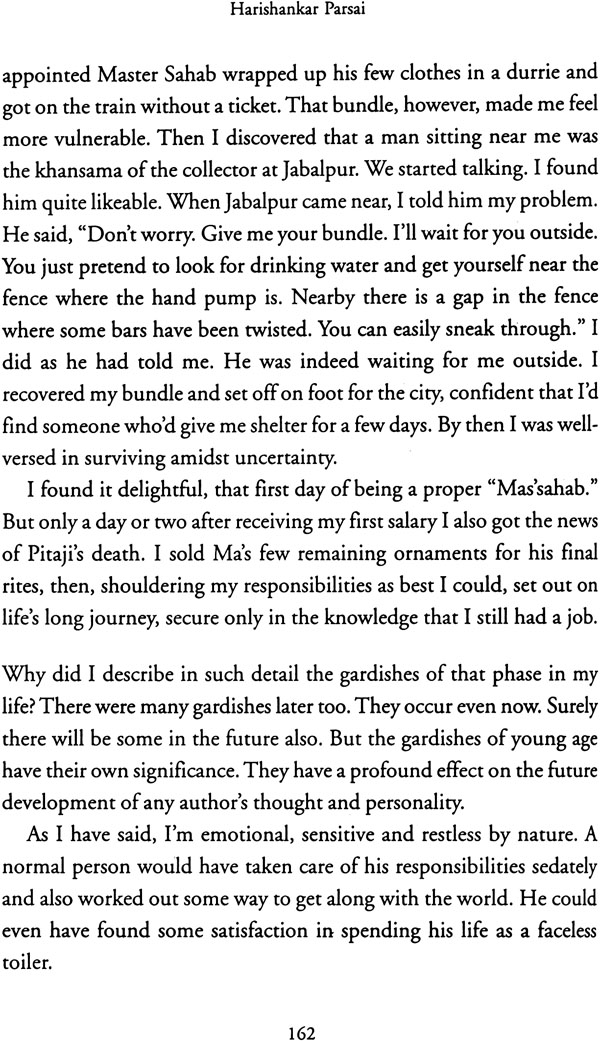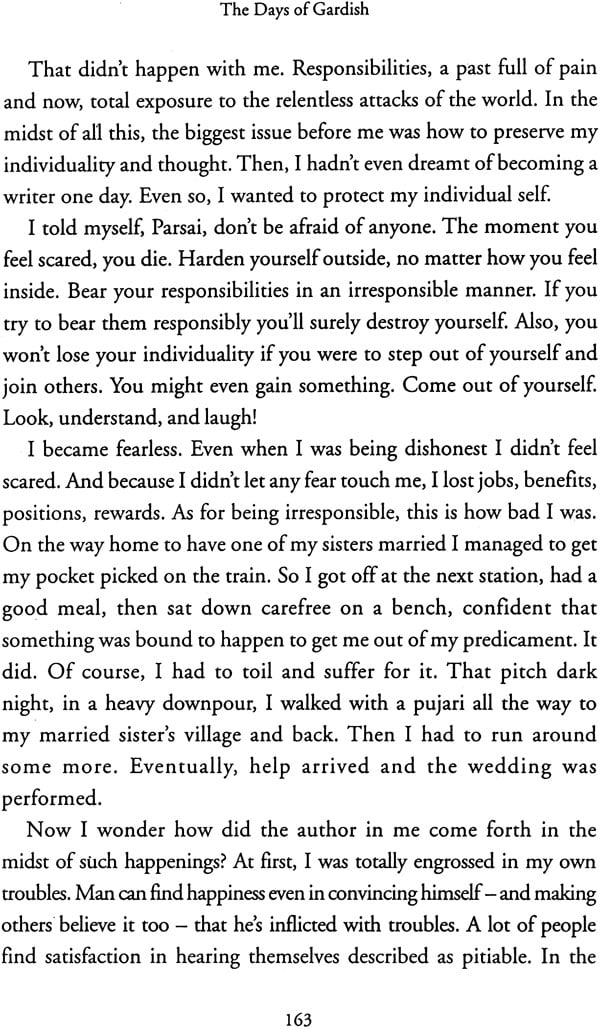
Inspector Matadeen on the Moon
Book Specification
| Item Code: | NAG706 |
| Author: | Harishankar Parsai |
| Publisher: | Katha |
| Language: | English |
| Edition: | 2003 |
| ISBN: | 9788187649762 |
| Pages: | 168 |
| Cover: | Paperback |
| Other Details | 8.0 inch X 5.5 inch |
| Weight | 220 gm |
Book Description
Modern Hindi prose had its beginnings in the 1870s. Bharatendu Harishchandra (d. 1885), the father of almost everything modern in Hindi, also developed the language as an effective vehicle for humour and satire. He directed his barbs not merely at the hypocrisy of his fellow countrymen but also at the English misrule, thus setting the path for all future satirists in Hindi. Politics and society became the two most popular - and deserving - targets. Of course, these two topics also found favour with all serious writers in Hindi, just as many of them found some form of humour to be not only effective but often inevitable in the course of their predominantly non-satirical writings. Premchand, for example, had much success with his satirical series Mote Ram and even had to face serious legal trouble on its account.
Post-Independence Hindi witnessed an explosion of satirical writing. Par ninda sukh or schadenfreude being the staple in any beleaguered society, satire flourished in Hindi as never before. Magazines and newspapers carried regular satirical columns, and there was no dearth of satirical stories and even novels. Writers like Shrilal Shukia, Sharad Joshi, Manohar Shyam Joshi, Mudra Rakshas, Gopal Chaturvedi, Sudhish Pachauri, Prem Janamejaya and Latif Ghonghi - led by Harishankar Parsai - helped Hindi satire attain its full stature as a valid literary genre.
No writer is perhaps so inseparably identified with his chosen genre in Hindi literature as is Harishankar Parsai with satire. But his earliest writings were in that pathos-arousing idealistic mode that was so characteristic of Hindi writers - mostly from the lower middle class - who took to writing after 1947. His first book, Hanste Hain Rote Hain (We Laugh, We Cry), published in the early fifties, was a collection of heart-wrenching short stories based on the trials of his adolescent life.
By then, he had come under the influence of the so called "radical socialists" - led by Acharya Narendra Dev, Jayaprakash Narayan, Ram Manohar Lohia, and others - who had broker: away from the Congress led by Jawaharlal Nehru. Though he soon became disenchanted with them due to their negativism after their abject electoral defeats. That experience also cured him of his romantic idealism. He became an ardent Marxist and continued to remain one, the dissolution of the Soviet Union notwithstanding.
But Parsai was neither a demagogue nor a blinkered theoretician. The roots of his commitment did not lie in Das Kapital but in his bitter experiences in our caste and class ridden society. As the barely adolescent breadwinner of his orphaned family and the surrogate father to his two unmarried sisters, Parsai experienced first hand the hypocritical morass of contradictions that Hinduism could degenerate into.
A significant but often overlooked fact in Parsai's biography is that he gave up his very first job in the forest department, thus refusing to make a fortune by conniving with the rapists cf India's ecology, and chose instead to become a humble school teacher. In the classroom he came face to face with the overwhelmingly poverty ridden "future" 0 India. On the larger national scene he saw the comparatively painlessl won freedom being gradually gnawed away by a more predatory class of native masters - corrupt bureaucrats, avaricious politicians, amoral businessmen, rapacious contractors, permit-brokers and middlemen, smugglers and mafia dons, and the much worse purveyors of linguistic, regional and caste hatreds and the fundamentalist fascists of various faiths.
It was this milieu that made Parsai opt for satire as his literary forte and weapon. But he had little patience for literary niceties, even of the socialist-realist kind. Whatever he wrote had to be direct, unambiguous and bold. His friendship with the great poet and critic Gajanan Madhav Muktibodh (d. 1964) further strengthened him in his socio-political commitment. By the mid-fifties, Parsai had gained enough reputation and self-confidence to launch - with considerable help from friends - a literary magazine, Vasudha, from Jabalpur. Though it attracted wide attention and significant contributors, it had to be discontinued after three years for want of financial support. Meanwhile, the growing pungency - and popularity - of Parsai's writings were posing a serious problem to him, a teacher and a government servant venting his spleen at everything that was venerated in the body politic. He then took a decision - undreamt of in those days of acute unemployment and fraught with risks even in this era of an apparent media boom. He resigned from his teaching job to become a freelance writer, and remained one till his dying day.
It was only in 1985, when his scattered writings in books and newspapers were collected in six volumes running into nearly two thousand and five hundred pages of demi octavo size, that the astounding dimensions of Parsai's oeuvre revealed themselves. Very few authors in Hindi have been so honoured in their life and Parsai, characteristically, made some fun of himself and the book's editors in a prefatorial note to the Rachnavali. That collection, which was not definitive even then, was left far behind by Parsai's prolific pen. Though illness and age took their toll, there was no stopping Parsai irt his iconoclasm, boldness and subversion. The only concession he seemed to have made to age was to write memoirs of several of his friends and acquaintances and some autobiographical pieces published in two volumes. But in his later book, with its provocatively ambiguous title Aisa Bhi Socha [ata Hai (It is Thought This Way Too), he offers yet again an assortment of essays on politics, culture, society and even literature, but almost none without some homage to his muse of satire.
| Introduction | 7 |
| Inspector Matadeen on the Moon | 13 |
| A Ten Day Fast | 27 |
| Contesting an Election in Bihar | 37 |
| Poor Trishanku | 50 |
| The Twenty Eighth Tale of the Vetal | 57 |
| Family Planning | 63 |
| The First Bridge | 70 |
| Gentlemen, Conmen and Congressmen | 76 |
| When the Soul Cries Out | 82 |
| Mufat Lal Goes for an Interview | 89 |
| Honouring the Sahab | 97 |
| The Prospectus of a Proposed Private College | 103 |
| Iti Shri Researchayah | 109 |
| A Journey with a Premi | 115 |
| Bholaram's Soul | 122 |
| Tiny Tales | 129 |
| A Fast Unto Death | 134 |
| Pulled Down Lamp Posts | 142 |
| A Shivering Republic | 146 |
| Divine Lunatic Mission | 152 |
| The Days of Gardish | 157 |
